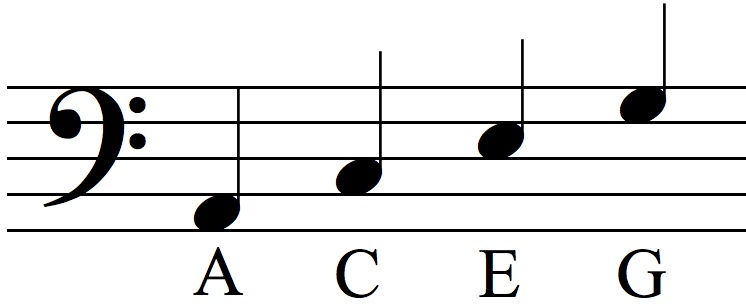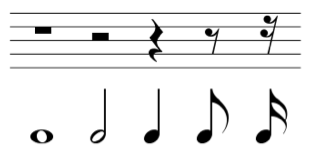mirror of
https://gitlab.com/magicalsoup/Highschool.git
synced 2025-04-25 21:41:45 -04:00
7.8 KiB
7.8 KiB
Music Review Sheet!
Intervals
How to determine an interval
- Size matters
- Count the number of
linesandspacesbetween and including the ones that the 2 pitches are on (+2)- Do not count them as the enharmonic equivalent, a
C flatis aC flat,NOTaB- Construct Table
Size Number of Semitones P 1 0 M 2 2 M 3 4 P 4 5 P 5 7 M 6 9 M 7 11 P 8 12 - Remember:
P, M, M, P, P, M, M, P- Remember:
0, 2, 4, 5, 7, 9, 11, 12- Construct Keyboard
- Tone, Tone Semitone, Tone, Tone, Tone semitone
- Chop sticks
- Foot ball posts
- Put 2 pitches on the correct notes on the key board
- put the pitches correct / corresponding to the key
- Count the number of semitones
- Counting from one semitone to the other counts as
ONEsemitone- Example:
CtoC#isONEsemitone- Find Quailty and Quantity of Interval
- Look to your table and see what is interval matching the correct number of semitones and size
- Example: An interval with the
size of 5and7 semitonesis aPerfect 5th
How to construct an interval
- First count the size of the interval to find the note
- Then count the correct number of semitones from the base note to find the pitch of the note
- Example:
- G is the base note, constuct a major 2
- Count for 2 notes, you get A
- Count 2 semitones from G
- G -> G# (1 semitone), G# -> A (2 semitones)
- A is the correct answer
Rhythms
Go to this link for more information and practice
Remember: The Grand Staff Lines are counter from the
bottomtotop
Treble Clef
- F A C E
- E G B D F
Bass Clef
- G B D F A
- A C E G
- The
G Clefis TheTreble Clef- The
F Clefis theBass Clef
Ledger Lines
- Only there to suppor the note
- Do not write it above the note
- Is to extend outside of the
grand staff
Notes
Measure, Bar Line and Double Bar Line
- Music is divided into equal parts by BAR LINES
- The area between two barlines are called a MEASURE or a BAR
- A DOUBLE BAR LINE is written at the end of a piece of music
- Its made up of one thin and one thick line
- The thick line is always on the outside
- On a grand Staff, the double bar line passes through the entire staff
- When dividing barlines, be sure to divided evenly
Unit 3
Time Signature and Note Values
- The UPPER number tells how many
beats (or counts)are in each measure.- The LOWER number indicates what type of note receives 1 beat
Whole Half and Quater Rests
- Remember:
Bat,Hat,Squigly- Remember: If an entire bar/measure is rest, then mark it with a
WHOLErest, doesn’t matter what time signature it is
Ties and Slurs
- Tie joins two notes of the
samepitch- The tied note’s value is added to the value of the first note
- The tie should always be written on the opposite side from the note stems
Unit 4
Repeat Signs and Second Endings
- Two dots placed before the double bar indicates a
repeat signit means to go back to the beginning ## First and Second endings -It means after repeating from the end of the first ending, skip the first ending and go the second ending
Eigth Notes
- When you add a flag to the stem of a quarter note, it becomes EIGHTH NOTE
- They are 1/2 of a quarter note
- An even number of eight notes can be grouped together with something called a
beam
Eigth Rest
- Its equal to half the value of a quarter rest
Dotted notes - a Dot represents a value of half of its original beat - Example: A dotted quarted note is 1.5 beats
Unit 5
Dyanmic Signs
Italian Sign English Piano soft Forte loud Mezzo Piano moderately soft Mezzo Forte moderately loud Pianissimo very soft Fortissimo very loud
Italian Sign English crescendo or cresc gradually louder diminuendo or dim. or decrescendo or decresc gradually softer
Tempo Marks
Italian English Largo Very slow Adagio Slow Andante Moving along (walking speed) Moderato Moderately Allegro Quickly, cheerfully Vivace Lively and Fast
|Italian|Term|English| |ritardando|ritard. or rit.|gradually slower| |accerlerando|accel|gradually faster|
Articulation
Italian Symbol English staccato play the note short and detached. The italian word means “detached”.accent Play the note louder, with a special emphasis sforzando A sudden, strong accent. The italian word mean “forcing”. tenuto Hold the note for its full value. The italian word means “held”. fermata Hold the note longer than its normal value (approximately twice the normal duration)
Unit 6
Flats
- One semitone lower than the current note
- Remember, C flat is not the same thing as B
Sharps
- One semitone higher than the current note
- Remember, E sharp is not the same thing as F
Naturals
- If the note was a sharp or a flat, cancel it out
- C# –> C, Db –> D


















